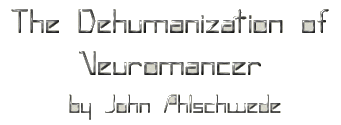

†††† The science of Neuromancer doesnít seem implausible by todayís standards. For example in Neuromancer, the drugs are stronger and commonly used through patches placed on the skin. Bizarre body enhancements exist, both functional and aesthetic. The internet is now fully-interactive, and can be navigated through a full-immersion environment, which probably works by either sending images directly to the optic nerves, or projecting images on the back of the retina. Not only has artificial intelligence been achieved, but the personalities of people can be captured and simulated by a computer. A new form of travel into space has led to a colonization of "the archipelago".
†††† But the technology is no longer merely an aid to humanity. Humanity, instead, has to adjust to technology. Space travel is somewhat common, but can cause sickness. The use of the internet dehumanizes its users. Case thinks of himself in terms of his existence on the net, and considers his life outside of it to be merely "meat". Up until he finds anger again, thanks to Wintermute, heís ceased to have tangible emotional experiences.
†††† The new technology is symbolized as insectoid to accentuate its foreignness . The Tessier-Ashpoolís headquarters is closer to a hive then a building humans would use. It stores cryogenically frozen clones as though they were unborn wasps. Wintermuteís actions stretch out through spidery tendrils of cause-and-effect. It manipulates and creates the people that it needs for its work, as well as slinking through the internet to take command over electronic devices. It canít even communicate with humans without copying a known personality to bring itself down to the level of humans.
†††† In reality, the alienation of people brought on by technology has reached new heights this century, with roots stretching back even further, perhaps since the very advent of tools. The printing press brought about the widespread use of the written word, sometimes drawing sharp lines between the literate and the illiterate. But surely itís the advent of the Information Age that has caused the most discomfort to humanity than any of the previous technologies. People have had to adjust themselves to this new presence in the home and in the workplace. It is this disparity between computers and people that Neuromancer uses for itís backdrop.
†††† The political aspect of Neuromancer follows a similar theme as the technological--of manís constructís mutating into a hindrance of man. The world has become is no longer defined by national boundaries. It consists of a one world economy. The corporations now control the world. There isnít a strict enforcement of national laws, but there is instead contracted exactment of revenge--usually for business reasons.
†††† This situation, coupled with the advanced technology leads to a culmination of specialization of labor with dehumanizing effects. People end up surgically modifying themselves for business reasons. Molly has her razors, mirrored eyes, and enhanced reflexes. Even the prostitutes have a chip in their brains. Whereas the interface cowboys spend so much time jacked-in that they have no outside life.
†††† The specialization of labor has always had this potential. The inhabitants of Papua New Guinea, for example, noted the loss of the luxury of working for themselves as the economy forced them to work for others. Certainly there is a strong parallel between Caseís absorption with the internet and the intense working conditions under which microchips are often made in Free Trade Zones in the Third World of today.
†††† In Neuromancer, the power of corporations over life and death and the surgery and obsession of many trades, combined with the technology which reshapes lives and prizes humans for their spare parts, ends up making humans the smallest cell in a giant world organism. Man ceases to be the measure of all things, and becomes, instead, an expendable product. The worth of the man is commercialized and often the result of his surgery, or, in the case of Wintermuteís culling, the result of mechanical tinkering and emotional manipulations.
†††† Science fiction takes trends and amplifies
them, showing us what could happen if they continue on their present route.
The cautionary tale of Neuromancer is especially relevant today--much more
so than when it was written. The internet has blossomed into a commercial
juggernaut, and big business has more political power today in America
than it ever has before. Technology and commercial interests arenít inherently
bad things, but reading Neuromancer helps us to appreciate the changes
in life we are experiencing today and remember that before big business,
man had to make something to sell, and before he produced technology, he
had to climb out of the trees.
†
 |
 |
|
|
|
The authors of these works are sincerely seeking comments and criticisms, please send them here.
The works on these pages are the intellectual property of their creators and are copyrighted by their creators. All rights reserved.
Feel free to e-mail us at: [email protected]